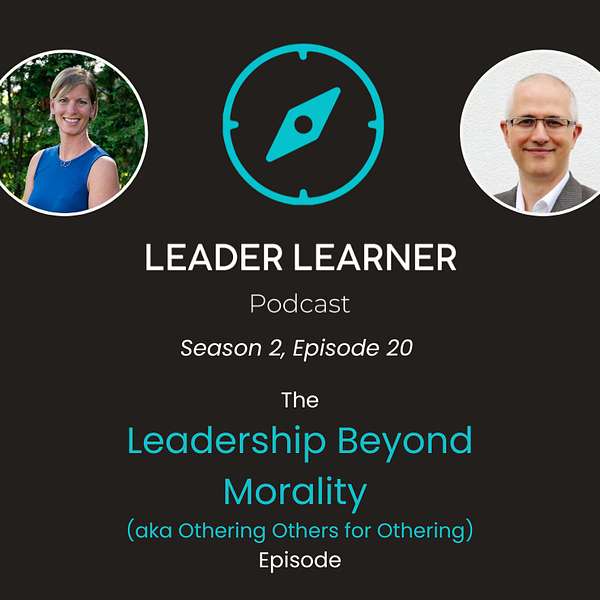
The Leader Learner Podcast
The Leader Learner podcast is for readers and leaders of all kinds. Theresa and Vincent both work as external learning and development providers to global organizations, supporting them in different ways.
In this podcast, they explore what they're learning from and with the organizations that they work with, as well as what they are learning through their own leadership practices.
The Leader Learner Podcast
S02E20: The Leadership Beyond Morality: Othering Others for Othering Episode
•
Theresa Destrebecq & Vincent Musolino
•
Season 2
•
Episode 20
Check-In:
- If you had the whole world's attention for 30 seconds, what would you say or do?
Big Ideas:
- Hypocrisy and leadership
- Immorality in leadership
- Do leaders have to be good people?
- We think of leadership as for the good of the people
- What tactics are immoral leaders using to get people to follow them?
- Leadership as a pipeline - a relationship between people
- How you position yourself in respect to other people
- Leadership can be about how you hook and attract them
- Charisma as a tool to attract people
- "Othering" of people - politicians using this tactic to gain followers
- Commonality and the group to bring people together
- Using fear with your own people to hold them
- Totalitarianism versus Populism
- The leadership purpose is different from the tools
- Inverse charisma - how you draw people in based on how you listen to them, not how you talk
- Charisma as a source of power - do people give you charisma?
- Shifting leadership depending on our audience - some people need to be listened to, some people need to be inspired
- Adaptive or situational leadership
- Leading from the front, not the back
- Cultural aspects of leadership
- Open and closed ways of leadership
- Our own biases shift how we perceive a leader as good/bad
- Leaders who are reassuring and are perceived as "strong" - people looking to leaders for strength
- Leaders are leaders because they help other people not feel afraid
- Idea that leadership starts from within
- People wanting to be told what to do and how to think
- Power over versus power with/power to
- What do you do when you want to offer people power, and they don't want it?
- Freedom is hard. Ignorance is bliss.
- Do people really want autonomy?
- Are we participants in the creation of immoral leadership?
- Amoral leadership - leadership without morality
- Immorality creates an us/them
- Should leadership be moral?
- Trust is a psychological mechanism, value is what you think is important
- Can we try NOT to use the moral lens when talking about leadership?
- Pragmatism versus morality
- Take morality off the table and listen for their values
- How we embody values can look different
- How stay on debate without arguing
- Power in having a structured debate with a strong moderator
- Debating from the opposite side of your beliefs
- Constructive conflict that leads to innovation and creativity
- Disagreement isn't the same as conflict
- Leadership is when you stay outside of our "animal self" - you stay above the fray
- "People are hard to hate close up. Move in."
- Easy for us to form opinions about other people without really knowing them
- Change the conditions by which you measure people and you can say anyone is anything
- Does a leader need to go beyond morality?
- Easy to other people for othering others
- Values as a factor in conflict because of it's rigidity
- Globalization has led to value conflict
Resources Mentioned:
More yummy content on leaderlearner.fm

